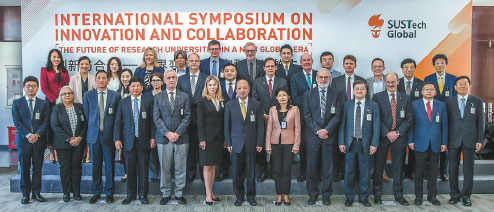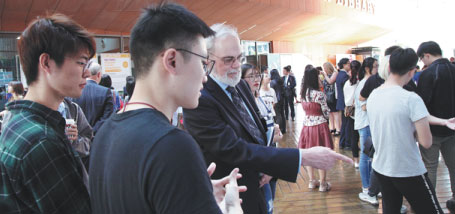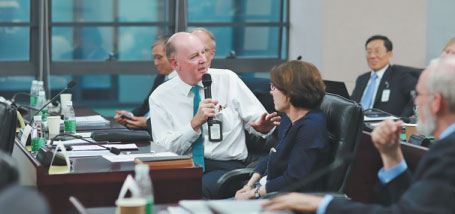Global universities united in future collaboration
Academic leaders attend SUSTech's first symposium for global partnerships
Academic leaders from four continents provided their insight and solutions for coping with the new challenges faced by research universities this week in Shenzhen, South China's Guangdong province.
The critical issues include intensified competition driven by technological innovation, the responsibilities of research universities toward society, the necessity for universities to continue collaborating across borders, and the latest strategies developed to maintain the internationalization of universities.
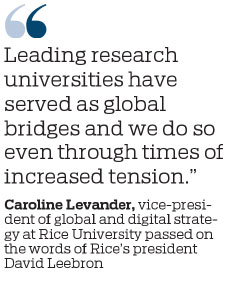
The issues were raised at the International Symposium on "Innovation and Collaboration: The Future of Research Universities in a New Global Era" held at the Southern University of Science and Technology, a young research university that has gained wide global recognition.
Organized by SUSTech Global, the university's international office, the symposium was also held to mark the fifth anniversary of the global partnership development at the university, which was officially launched in 2012.
Zhang Dongxiao, provost and acting vice-president of SUSTech, said the university has placed much emphasis on its international partnerships as it strives to be a university of world-class quality, playing a pivotal role in regional development with global impact. SUSTech has established partnerships with more than 100 universities in 25 countries and regions spanning five continents, Zhang said.
Tan Fuying, deputy director general of the Shenzhen foreign affairs office, said the extensive international network of SUSTech contributes to the city's ambition to grow into a modern metropolis and an international hub for innovation.
The defining theme of the day's discussions was undoubtedly the constraints on international academic collaboration caused by shifts in the geopolitical environment and the unchanged commitment of higher education leaders to education and research collaborations across borders.
The tone was set by the opening remarks of Caroline Levander, vice-president of global and digital strategy at Rice University on behalf of partner universities, who passed on the words of Rice's president David Leebron that "leading research universities have served as global bridges and we do so even through times of increased tension".
The role of research universities as bulwarks against the tides of isolationism and self-interest was reiterated across the symposium, as speakers stressed the impossibility of global decoupling in a world interconnected on all levels.
Zheng Chunmiao, SUSTech vice-provost of global strategy emphasized in his keynote speech entitled "The new Chinese universities and their international drive" that the "problems we face are global in nature, so we need global collaboration", and he sketched the very particular international profile that a new generation of Chinese universities and SUSTech have implemented.
Eric Grimson, chancellor for academic advancement at the Massachusetts Institute of Technology, spoke on the subject of international collaboration in higher education and expounded upon MIT's innovative programs designed to provide international experiences for students.
Along with other speakers at the symposium, he reported a noticeable change in student motivation over the last generation. Students no longer prioritize a financially rewarding career but look for a professional future where they can make a meaningful impact by addressing societal issues.
"Students know they need to have a global perspective and want to tackle global problems," Grimson said.
The first two panel sessions focused on the future of international collaborations among universities and the game-changers in concepts, practice and challenges in internationalized campuses.
The sessions were chaired by Yves H. Berthelot, vice-provost for international initiatives, Georgia Institute of Technology and Rongyu Li, deputy vice-chancellor (external engagement), University of Queensland, respectively.
Panelists debated the responses to the new global era and emphasized academia's role in strengthening globalization through its inherently collaborative nature. "Collaboration is truly in our DNA. We are passionate about it. As educators we want to create the next generation and create new knowledge and solutions," Berthelot said.
The afternoon's keynote speech by Peter Mascher, vice-provost (international affairs), McMaster University, was titled "Building of international research networks to address global challenges and to enable knowledge transfer".
He used the example of the U15 group of research universities within Canada and the international Universitas 21 network for an analysis of the critical characteristics that impact the success of networks.
They include being people-centered, capacity building across borders and private-sector engagement.
Mike Shipman, Warwick University's pro-vice-chancellor (international), delivered the day's final keynote called "Embedding broad-based and deep international partnership - the example of Warwick's institutional partnership with Monash University". His remarks made a compelling case for the value of forging strategic partnerships with institutions that share a similar spirit and academic mission.
The afternoon panels focused on teaching and learning at universities in the global era, chaired by Albert Chau, vice-president (teaching and learning), Hong Kong Baptist University.
The social responsibilities and sustainable future of universities panel was chaired by Nathalie Lugagne, vice-dean for executive education, HEC Paris.
They delved into the remarkable recent shift in focus of research universities toward civic engagement and producing tangible responses to global challenges such as climate change.
In the final reflective discussion, chaired by Gerard A. Postiglione, chair professor, University of Hong Kong and council member of the SUSTech Higher Education Research Center, further elaboration on topics debated during the day moved from the motivations of students to the role rankings play in higher education.
Tours enlighten cooperation
In the break between the morning and afternoon sessions on Sunday, delegates were treated to a tour of the modern-looking campus where they visited SUSTech's state-of-the-art cryo-electron microscopy laboratory before ending at the Lynn Library.
There, a session was held in celebration of the university's study abroad programs with partner universities.
Students from these programs shared their experiences with the delegates, and generated a lively discussion on how international experiences broaden the world view of academic talent.
Chancellor Grimson from MIT was impressed by SUSTech's global ambitions. He found that students at SUSTech and MIT have the same passion for changing the world.
He said he looked forward to further interaction with SUSTech's students, and encouraged them to enroll in humanities and social sciences courses and activities to broaden their education.
On the second day, SUSTech arranged for symposium participants to visit industry partners. Richard Harvey, academic director of admissions, University of East Anglia described the Tencent visit in particular as "awe-inspiring...very, very illuminating" and also expressed his admiration for the DJI and SUSTech education collaboration.
Mike Shipman commented on his visits of Huawei and the National Gene Bank. "Really interesting high-technology businesses where clearly the integration of knowledge, innovation and learning has a big impact on the products and initiatives that they can deliver. Great to see," he said.
Leo Mian Liu, vice-president of global partnerships and director at UTS International, believed the visits "showed the strong link between SUSTech and industries and the corporate world. I think that one of the key features of SUSTech is having close industry linkage".
|
|
|
MIT Chancellor Eric Grimson engages with students at the study abroad poster exhibition.Photos Provided To China Daily |
|
Lively discussion at the symposium, UEA Academic Director of Admissions Richard Harvey speaks at the reflection session.Photos Provided To China Daily |
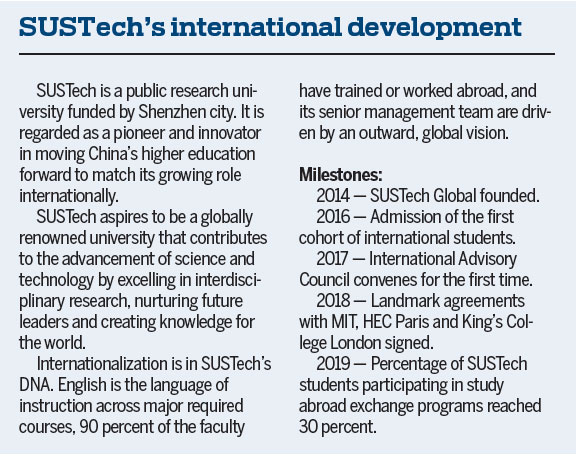
(China Daily 11/14/2019 page12)


